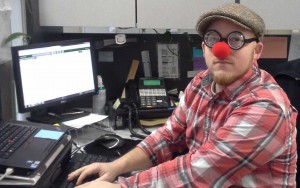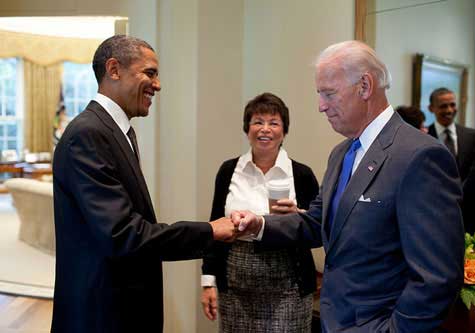Have you, the reader, considered your own handshake? I can say confidently that I never had until someone brought it my attention. If you are someone prone to over-analyzing things, I kindly request that you continue reading.
What’s in a handshake?
There are many opinions on shaking hands. There are books on it. Some have a phobia of it. Others refuse out of principal to do it. There is even an equation for the perfect handshake (see below), one that conveys admiration and conviction to the handshake recipient. Some consider it an art form in its own right — the importance of the measures, its fluidity, how long you hold on, and eye contact.
There are those who see the handshake as a disgusting, germ-smearing fad. Some of the folks in this party believe that we should ban the old handshake and make way for the fist bump. Studies have shown that the fist bump transferred 90% fewer bacteria than the handshake. Another consideration is the high-five, which transfers 50% fewer bacteria than the handshake. There are even buttons one can wear that state “No Handshaking!” This helps the potential shaker avoid the awkwardness of the potential shakee’s absolute refusal.
I have shook many a hand
Since arriving in the City of Seaside, I have shook many a hand. It’s one of the first things I do to establish the foundation of the conversation. I always do it when I meet someone for the first time. In a matter of seconds it’s over — from there we exchange formal salutations, and move on to the business at hand (no pun intended.)
My day started as any other day would with lots of handshakes and office work. As I typed away at my computer, one of my supervisors passed by my desk. He calls to me and says, “Let’s go for a ride.” When we go for rides we often check on projects, so for me it’s a chance to regain my focus after slouching over a computer for hours on end. As we passed by the usual suspects, I couldn’t help but wonder where we might be going. When we arrive at a muddy lot, “I am going to need your help with the grate” says my supervisor. Its impression could be seen in the far corner. As we approach it, I stay ever mindful of my steps, attempting to avoid mud kick-up. I am told that there are some water flow issues we need to inspect. The grate was covered in mud, which we need to lift to inspect the flow — but this was not the main issue. The issue at hand is the absence of a clean wiping surface. Before I could point this out the grate was being lifted. I dove into help, where we found the water to be flowing just fine. Far cleaner than anything above it. As we replaced the grate, a voice from behind called, “Hello, boys!” It was the Mayor.
Some habits are difficult to break.
Since finishing my service in the Peace Corps, I sometimes find myself saying and doing things like I did in The Gambia. For example saying bubax (boo-ba) after making a point. It means “very,” but it can also be used as emphasizer at the end of a word or statement. Another example, is saying Inshallah — “If Allah wills it.” It’s a commonly-used phrase stating “Let’s hope so.” Yet another example, which I try hard to avoid, involves handshaking. In The Gambia, if your hands are dirty you offer your forearm as a handshake. It signifies to the handshaker that your hands are filthy but you still want to shake. They grab your forearm, you move your forearm up and down, they let go of your forearm, and then you greet the hell out of each other.
The mayor walked up to us with his hand out to shake. My hands are covered in mud from the grate. Any normal person would have shown their dirty hands and apologized. Not I. One of my Gambian habits reared its ugly head. The foreman shake. So here we were in the middle of this muddy lot, my arm extended out, limp handed. What was he supposed to do? The Mayor stuck his foreman out and kind of pumped mine. Awkwardly, I said, “Grab it.” The Mayor stared at my forearm and gave it a solid grab. “Isn’t that unique,” he exclaimed as we shook. I mumbled “it’s a Gambia thing… I’m sorry…” He gave me a strange look and then turned to my supervisor. “You want one too?” He asks. With a grin, my supervisor puts his hands up. “My hands are dirty, I’ll pass.” After this weird interaction, the conversation continued and we went our separate ways. It has never been discussed. But I have thought about it ever since and vowed to never do it again without a proper explanation.
So if you’re looking for a different type of handshake, offer the forearm. Say it’s an African custom. Maybe they will find it novel. Maybe they will think your odd, but either way, I believe it’s better than a high five or a fist bump. On second thought, maybe it’s best to keep to the original, the tried and true — the handshake. It is safe, known, and it doesn’t alarm (most) people or make them uncomfortable.
Interested in the mathematical handshake equation?
PH (Perfect Handshake)= √ (e^2 + ve^2)(d^2) + (cg + dr)^2 + π{(4^2)(4^2)}^2 + (vi + t + te)^2 + {(4^2 )(4^2)}^2
- (e) is eye contact (1=none; 5=direct). Ideal value = 5
- (ve) is verbal greeting (1=totally inappropriate; 5=totally appropriate). Ideal value = 5
- (d) is Duchenne smile – smiling in eyes and mouth, plus symmetry on both sides of face, and slower offset (1=totally non-Duchenne smile (false smile); 5=totally Duchenne). Ideal value = 5
- (cg) completeness of grip (1=very incomplete; 5=full). Ideal value = 5
- (dr) is dryness of hand (1=damp; 5=dry). Ideal value = 4
- (s) is strength (1= weak; 5=strong). Ideal value =3
- (p) is position of hand (1=back towards own body; 5=other person’s bodily zone). Ideal value = 3
- (vi) is vigour (1=too low/too high; 5=mid). Ideal value = 3
- (t) is temperature of hands (1=too cold/too hot; 5=mid). Ideal value = 3
- (te) is texture of hands (5=mid; 1=too rough/too smooth). Ideal value = 3
- (c) is control (1=low; 5=high). Ideal value = 3
- (du) is duration (1= brief; 5=long). Ideal value = 3
 About the Author: Jeremy Goldsmith is currently mid-way through his second year in RARE AmeriCorps Program with the City of Seaside. Upon completion of his RARE service, Jeremy plans to either start graduate school or get a job. He enjoys reading, the outdoors, music, and traveling. A life goal of Jeremy’s is to become the first Grand Master of paper, rock, scissors.
About the Author: Jeremy Goldsmith is currently mid-way through his second year in RARE AmeriCorps Program with the City of Seaside. Upon completion of his RARE service, Jeremy plans to either start graduate school or get a job. He enjoys reading, the outdoors, music, and traveling. A life goal of Jeremy’s is to become the first Grand Master of paper, rock, scissors.
